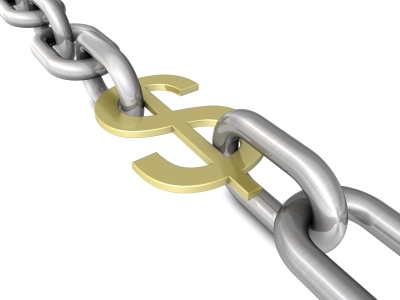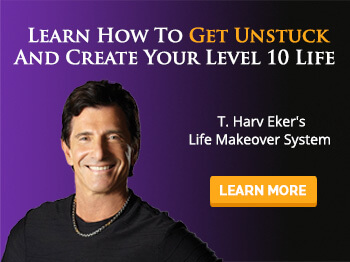From now on, whenever you have a goal, the only question you ask is, “How?” If you have a problem, the question is, “How do you solve it? How do you overcome it?”
All successful people ask how. They’re proactive. They’re action oriented, and the word ‘how’ is like pushing the button on a detonator. The answer always triggers you into explosive action. You can’t ask ‘How do I solve this,’ ‘How do I achieve it,’ ‘How do I get there,’ or ‘How do I overcome it’ without being triggered into taking an action of some kind.
If top people think about what they want and how to get it, what is it that unhappy, unsuccessful people think about most of the time? They think about what they don’t want and/or who’s to blame. That’s the basic summary of all abnormal psychology. They think about what they don’t want, which makes them unhappy, and they think about who is to blame, which makes them angry.
Unsuccessful, unhappy people are always angry at someone who they blame for their problems. The goal is to mature to the point where you realize that you are in command of your own life. You’re in charge. You make things happen. You are not a victim. That was then, this is now.
Never allow your past to determine your future. Think about what you want and how to get it.
When you turn toward the sunshine; when you think about what you want and how to get it, the shadow of negativity falls behind you. You realize you can’t change any of that stuff from the past anyway, so why fret over it anymore, yes? You have control over now. Now you can ask how. ‘Instead of what thinking about what I don’t want, what do I want, and how do I get there?’
One of the greatest wastes of life is to be upset about something that happened in the past that you can’t change. One of the great uses of life is to think about what you want in the future and how you’re going to get it. You keep your mind so focused on the future that all those other things just peel away like dead skin.
Don’t allow unhappy experiences in the past to keep re-emerging in your daily life. This is what holds us back. This is what stops people from succeeding.
Maybe some things happened to you that were beyond your control. Maybe those events had consequences that detoured or even derailed some goals in your life up until this point. Maybe you’re still living with those consequences. You are responsible for your life now. You are responsible for the things that you want and how to get them.
Nobody is smarter than you. Nobody is better than you. If they are doing better, they have just figured out how. They’ve gotten the recipe before you did, but the recipes are available to everyone.
What was the recipe for your success? How were you able to use basic, simple psychology to turn your situation around from lethargy to activity? What’s your story? We want to hear from you!
Each time I am on stage or working directly with my students in my mastermind groups, I tell them, “Don’t just take my word for anything.” And I mean it. Not everything is always right or wrong, and experience is always the best teacher. Anything we learn has to put it to the test for ourselves. However, I will say that what I’ve learned has worked for me, and it’s worked for thousands. I am sure, especially during this economic challenge, that you have seen “financial gurus” promising you secrets on how to change your financial situation instantly. What makes me any different than the others? Why should anybody listen to me?
It’s not like I had some special gift that got me to where I am today. Like some of the best things in life, the turning point in my financial destiny came to me completely out of my control. See, after yet another failed business venture, I was forced to move back into my parents’ basement. A visiting friend of my father’s—a very rich friend—took pity on this 20-something still living with his folks and gave me advice that literally changed my life.
He said, “If you thought the way rich people do and did what rich people do, do you believe you could become rich too?” I probably hemmed and hawed some kind of ‘I guess’ response, and he added, “Then all you have to do is copy how rich people think.”
The missing ingredient in my bid for financial success was two-fold. Not only was it knowing what other successful people know, but it was also knowing what was going on in my own mind.
Without examining our true beliefs, sometimes we can block our own success and not even realize it. For me, even though I said I wanted to be rich, I had some unconscious worries about it. I was afraid that I might fail, or even worse, succeed and then lose it all, then look like a fool.
Eventually, I became aware of how my own thoughts were holding me back from wealth, and more importantly, I learned several powerful ways to “unlearn” what we’re typically conditioned to think when it comes to money, so I would think in the same ways that rich people do.
How many times have you challenged your own thoughts and beliefs about money, or about who you really are for that matter? How do you really feel about yourself? Do you actually believe that you deserve to be wealthy? Our personal blueprint ends up determining our money blueprint, and we need to understand these influences before we can begin transforming into a millionaire mindset.
I believe our lives are shaped by defining moments and the decisions that we make from them. From one embarrassing yet insightful incidence, I made a decision to learn everything I could about the psychology of money and success. My results speak for themselves.
It’s true: rich people really do think differently than most. To make that transition, you have to let go of some of your old ways of thinking about money and about yourself, and adopt some new thought patterns. In other words, you need to learn how to think like someone who is rich.
It really is that simple. If you think like rich people do and do what they do, chances are you’ll get rich too!
That’s got to sound ironic coming from someone who believes whole-heartedly in the benefits of being rich. Forget about getting out of debt, paying bills, buying nice things, etc. That stuff’s great, but at the end of it all you’re not going to give a damn about your credit rating. Money’s the last thing on your mind in that moment, I would imagine.
Money can reduce the stress of living, but it can bring just as much if not more anxiety. I’ve gone through my cycles of accumulating and losing money, getting more and losing it again. The money wasn’t burning a hole in my pocket. I just had a big hole in my pocket and didn’t bother to sew it up. That hole represented something in my mental blueprint that kept me from being stable with money. There was nothing wrong with the money.
On the other hand, people without money often think if they just had enough to do this or that, then things would be better. While that may be true, what happens when the mind goes into ‘Only if …’ consistently? That’s exactly what you get … ‘only if.’
‘This will only happen if…’
All of a sudden nothing’s happening and you don’t even know or remember that rule you created. In business that thinking often translates into “It takes money to make money.” No! If you have money it can certainly grow more money, but it doesn’t take money to make money. It takes creativity to make money.
Throwing money at a problem is disaster! In business there’s no such thing as a money problem. That problem grew out of somewhere else. You want to fix the root of the problem. If you throw money at a business problem, you’ll have the same business problem for the rest of your life and no money. Creativity and knowledge are the answers, not money.
It’s also not logical to blame money for people’s shortcomings, or the world’s for that matter. Obviously there are people that are rich and greedy, but there are poor people who are greedy and there are middle class people who are greedy. There are rich, poor, and middle-class people who are generous. There are rich, poor and average income people who can be both generous and greedy, depending on the stress they’re going through at any given time.
To say rich people are greedy as a blanket statement is just as unfair as saying poor people are lazy. I’ve met many a hard-working poor person who just hadn’t yet turned the corner on working smarter instead of just harder.
Money can’t be the root of all evil. Envy, jealousy, and greed—all based on fear of not having or getting enough of something we want—pre-dated currency (think about the story of Cain and Able). It’s a part of what it means for us to be human.
If money isn’t the cause of all that’s wrong, it’s not going to be the cure either. It’s not the answer. It’s the fruit of our expansion—or lack thereof—beyond ourselves and of the impact we’re having on the world. What we choose to do with that is a result of who we choose to be, not because of money.
Our lingering resentments and unresolved conflicts derail what is otherwise a universe that’s waiting to put us on track for success. We just have to open to the awareness that what we say we want and how we unconsciously operate often contradicts one another. If the universe were able to feel, it’d be just as frustrated by our blocks as we are.
Once we open up, we can start resolving past hurts, realizing that the pain may have been understandable for that time, but it’s only going to cause further damage if it’s not attended to immediately. So we mend, sometimes bending to meet another halfway, even if nothing about them has changed. We forgive them not for their sake, but for our own good. We can’t control who they are or how they’ll respond, but we can be effective through our sincerity. If our forgiveness releases them from pain too, bonus!
As important as all of this is though, the root of it all is as natural as our ability to breathe. It’s fear. It’s a part of us. We’ll never get rid of it. No amount of wisdom or experience will ever be enough to prevent it. We just get better at faking it out.
When you really think about it, the mind isn’t all it’s cracked up to be. It’s useful for sure, but only after we’ve attained a certainty degree of emotional maturity. I would go so far as to say also a level of spiritual maturity, but that’s not even the main point. There’s got to be something else within us aware of its control over our mind and emotions. If we let either of those control us, we’re not much better than self-trained apes or temperamental drama queens!
The brain is a tool, but it’s also got … a mind of its own. Its mind is not to make us successful. It’s not concerned about us thriving. Its purpose is for our survival at a base level. Its job is to anticipate what’s coming and preserve our basic needs within that anticipation. In other words, the mind lives in a future reality that doesn’t even frickin’ exist yet! Our mind creates the greatest soap opera script. It makes up incredible stories, usually dramas and disasters that never happened and never will.
The secret to freedom is to realize that you don’t have to believe your mind. You don’t have to believe your story. You don’t have to believe that voice in your head. You don’t have to believe your own thinking. You can simply observe it and say, “Thank you for sharing,” and then take the necessary action you’re scared to take anyway.
One of the biggest mistakes that most people make is waiting for the feeling of fear to subside before they act. It’s not necessary and it’s impossible anyway. Rich and successful people have fear, worries, and doubts. They just don’t let those things stop them.
Don’t resist taking chances. Take them like vitamins. Let go of the brakes. Don’t worry about the bumps and bruises. You can take them. Don’t steer around what scares you. Go over. Go under. Go around or go through. Do something others would be terrified to do. You will feel your chin rise up from your chest and there will be one less thing you can’t do. Just freaking do it!
Last week we took a look at how anger is one of the bitterest pills you can swallow. It’s the pill that doesn’t dissolve. It just sits there, potentially poisoning any and all good that comes into our lives.
You can’t have a fresh start to a relationship—with people, money or anything else—until you’ve cleaned up that lingering resentment with your parents, spouse, friend, lover, relative or whoever hurt you in the past. If you don’t clean that up first, you’ll drag that hurt with you.
A quote that I really like is from a book called ‘Your Cosmic Destiny’ by W.A. Chapman. It says, “Holding on to anger and resentment is like drinking poison and expecting someone else to die.”
So how do we let go of anger? We looked at opening ourselves to the other person’s perspective: there might be something going on that we didn’t know about.
The other part of letting go of anger is to forgive those people, even if they were dead wrong; even if they’re still freakin’ jerks. We all do the best we can at any given time. It may not be one of our best moments in life, but it’s the best for that time. Understanding this simple truth makes a huge difference in letting go.
Whatever happened to make us so upset, it’s not the event that has us any more. It’s the story about the event and our choice to keep that story alive. All we have to do is remind ourselves that both us and those we’re angry with were not getting (or perceived we weren’t getting) what we wanted, and both www.fertileheart.com/clomid-clomiphene-infertility-treatment/ side’s reactions are based in fear. Our conditioning blocks our higher selves from stepping back and looking at things as they are, not as we fear them to be.
When we become aware, though, we now have an opportunity to make new choices. We can consciously choose to come from our higher self—be the person we know we can be—forgive and move on, remembering that punishing them any longer only hurts us.
So you don’t necessarily forget but you do necessarily forgive. Forgiveness is the key because when you release them from their deed (or non-deed as may be the case) you automatically release yourself from the anger and negative emotion around that deed.
It’s been way too long, with too much hurt and too much pain. For your own sake, tell whoever you need to that you forgive them, or that you’re at least willing to let it go. Forgiving is not condoning, and it’s certainly not forgetting. Forgiving is our way toward healing.
Here’s what’s important to remember, though: do not expect ANYTHING from them! Heck, in your mind that person “deserves” your forgiveness, but they may feel like they don’t need any forgiving. They might actually be resentful toward you, but that’s okay. It’s not about them. The process is for you. Say your piece, hear and accept their side, and be on your way in peace.
What was the most impactful result of forgiveness that you’ve experienced—from either side of the equation? What significant changes in your life happened as a result of clearing anger and resentment with someone important in your life? We want to hear from you!
Of all of the negative emotions we have to deal with, the most debilitating of them is anger. Anger sometimes runs and can often ruin lives.
I was angry at my dad for years. When I was a kid, I had this coin collection that I was really proud of, and I kept the coins in this piggy bank. My dad knew where I kept it as well, and one day it was just gone. My prized collection that—in my mind at least—I worked so hard for, just disappeared. Eventually, the piggy bank reappeared, but when I angrily accused my father of stealing … let’s just say he responded pretty angrily, too.
I thought of it as one of those things that ‘just happens,’ and you move on, yes?
Throughout my adult years I never re-examined that incident. I never considered his side of the story. My perspective was, ‘I’m right and that’s that!’ Fine and swell except for one problem: I unconsciously decided that men weren’t to be trusted with money or anything else. The anger and distrust was holding me back, not him. Think that had an effect on my long-term success and happiness?
Most of us are run by our past circumstances. We play the victim role based on an idea that it’s all our parents’ fault for how they raised us. ‘This is what happened, this is the conclusion, and now this is what I do.’
‘You want me to be a success? I’ll be a failure just to show you what a lousy parent you were!’
The most important thing to the conditioned mind is to be right. And when we’re angry, it’s usually about not getting what we want, and we feel justified in our position for the reason of the moment. So we retaliate by not giving the person that we’re angry with what they want. Meanwhile, we’re often going down the drain with or without them, true or true?
So … five different cities, 12 different businesses, 14 different jobs and 35 years later, I learned my dad was actually showing my prized coins to his poker buddies, and he didn’t want to confuse my coin collection with the poker pot so he just kind of stashed it away and forgot to put it back where I kept it. He was proud and protective, not a thief. Only when I became aware of why I wasn’t settled down—as a form of rebellion, anger and retaliation—I was able to make a new choice and build lasting success in life.
Anger and resentment only hurts you! You feel it, not whoever you’re angry at. It gets stuck in the cells of your body, not theirs. It makes you sick, not them. Even worse, sometimes that anger might actually be totally unwarranted, a simple misunderstanding. It’s not worth hanging on to.
Search your past for an emotional incident that resulted in your getting angry about something that concerned money and/or at least one other person. The idea is to simply re-look at a past or childhood situation from your current and (possibly) more mature point of view, and consider revising it so that it doesn’t haunt you anymore. What’s your story? We want to hear from you!
There’s nothing like a little self-congratulation for the ego, yes?
I’d rather pat myself on the back and maybe look like an egotistical jerk than to maybe get no praise at all. We recently took a look at the power of receiving—including compliments. That doesn’t mean we can’t give ourselves some props, too. In fact, it’s important for success-building.
Why? Because we’re creatures of habit. Success is a habit as is failure; and mediocrity—which is worse than failure. Mediocrity is this lukewarm thing where there’s not enough pain to make you want to move.
The more success, failure, or mediocrity you live in habitually, the more natural that process becomes for you. When your mind is comfortable and used to success, success becomes your path of least resistance. And success therefore becomes normal and automatic.
So how do you utilize this law in your favor? Simple: recognize and acknowledge your successes. Some people say, “Not focusing on my success keeps me striving.” I say it keeps you unrewarded, unhappy, and in a pattern of failure.
We all love to be recognized and rewarded for our good deeds, yes? Feeling significant is a basic human need. Most of us unfortunately have let some of the greatest successes of our entire lives just totally slide into oblivion, without ever really acknowledging or celebrating them in any way, shape, or form. It’s important that we keep our big successes in the forefront of our mind for references and to reinforce our confidence.
Isn’t it true that our mind will almost always pick out what’s “wrong” with us? In what we can’t or shouldn’t do? It hardly ever goes back to the great things that we did. So if you want to go out there and do something new like make a couple of million dollars in a certain amount of time, it’s going to seem scary because your mind isn’t going to go, ‘You’ve handled this before. Not a problem.’
That has to be a conscious thought that we force in there. Left by itself, something new or scary will make the mind go, ‘Hell, I don’t want to do this!’ So it’s important that we keep whatever successes we’ve had at the forefront of our mind. We want to ingrain them as best we can on a physical or emotional level so that they’re part of who we are.
Can you come up with three of the greatest successes of your life in any area, right now? If you can’t come up with three successes, you are way too hard on yourself. If you have trouble coming up with three successes, you won’t even look at anything good about yourself which means you won’t look at other good things about other people or anything.
They don’t have to be incredible. They just have to be big successes for you in the situation you were in. What have you overcome? It could be business. It could be relationships. It could be money! It could be from childhood. It could be sports. It could be anything. We want to hear from you!
I have a friend who struggles with weight. Her intention to lose the weight is honest and sincere; desire and action is not the issue. She goes to the gym regularly, participates in multiple softball leagues, and does constant reading on diet trends, trying anything that might work. But eventually, the diet falls by the wayside even if the activities don’t, hence her progress fluctuates.
When I asked what the motivation was for wanting to lose the weight it was, “I’m disgusted with myself.” Okay, sometimes pain can be an effective motivator, but how about something a little more … self-supportive? I don’t know … like looking forward to the day you go to the beach and show off? That sounds a little more compelling and positively motivating, doesn’t it?
Everyone’s motivation is going to be different no matter what the goal, but whatever that “why” is, it better be powerful. It’s got to be emotional. Hey, sometimes it might even be reacting in a moment of total freak-out, but whatever that trigger is, make it mean something to you! If you have a good enough reason, you’ll figure out a way how, won’t you?
I have another friend who quit smoking almost a year now, cold turkey. He had smoked for over 10 years. People, including me, were surprised and proud, all wondering how he did it. No patch. No gum. No electric fake cigarettes. He said it was easy—he looked in the mirror one day and saw a small lump on his neck, in a lymph area.
He then flashed forward to imaginary moments of telling his friends and family that he had cancer. He thought about what it would be like to put them through watching him disintegrate, maybe suffer. He thought about the pain, guilt, and helplessness of those who wouldn’t have the strength to deal with all of that.
That small lump turned out to be only a garden-variety in-grown hair, but it was enough. He broke his last cigarettes in half and that was that.
When you have a big enough reason, the “how to’s” come a lot more easily. You need clear and powerful reasons. It’s also going to allow you to be willing to do whatever it takes.
More importantly, your why has to be stronger than those non-supportive beliefs you’ve been working on. Like, “Rich people are greedy.” Well great! You don’t wanna be broke, but “rich people suck,” and your freaking rent’s due.
You have to have a strong purpose for pursuing money, or anything that really matters to you. If you have nothing behind it, where is there to go? You’re either growing or dying! You’re either going to it or away from it! Got it?
What was one of the biggest challenges or obstacles that you faced in your life, and what was the push that finally got you over that hump? Was it life or death? Absolute need for safety or survival? Would a less desirable outcome have negatively impacted someone you care about? It’ll be interesting to see how many people were motivated to act when someone else would be affected by our actions, our non-actions. We want to hear from you!
I believe we are spiritual beings living physical lives, and to make the most of this life we have to take care of, nurture, and more importantly listen to the clues that spirit gives us, mostly through gut intuition and feelings we have.
At some point, though, we have to honor the physical side of our lives as well, and that means taking action. To hell if conditions aren’t perfect, or if this circumstance isn’t quite ideal or that person isn’t following through the way they said they would. We’ve got to take all these spiritual principles and put them into action.
That’s exactly where a lot of people get stuck, even those with greater awareness and knowledge. You know you want to work out, need to get into better shape for the sake of generating more energy to work your mission. But what step is often the hardest to take? That first one.
Depending how long you had been in your last cycle, getting the ball rolling can feel like pushing a boulder uphill, metaphorically speaking. You need to build the next muscle and final spiritual muscle that separates the successful from those still waiting at the gate: momentum.
Momentum is that force that makes it easier for someone who’s successful to do what’s right than to do what’s wrong. Momentum is that process of getting that snowball moving. The hardest part about working out is getting to the gym. Once you get there, it’s not that hard to do.
When you’re in motion, that’s when things begin to line up, not before (that goes for you perfectionist!). When in doubt, act. What did everyone else tell you? When in doubt, stop and think about it. No! That’s why I say thinking is dangerous to your wealth!
Most people who I know that got rich didn’t think too much. They saw a piece of property: ‘This looks good. Anything structurally wrong? Environmentally? No? Good, I’ll buy it.’ Twenty years later they’re very rich. They really planned that one out, huh?
Just as an aside, if you’re really “smart,” chances are you’re not going to be really rich. You’re going to get in your way, a real momentum killer. Those who aren’t too “smart” are open to knowing (A) They don’t know everything the need to know to be rich (B) Will learn how to be rich, even if it temporarily hurt’s their pride to know exactly how far off they were to begin with.
A body in motion will remain in motion and a body at rest will remain at rest. What do we want to do? Get into motion! Once you’re there, it gets easier. We already know that. Now we gotta just do it.
What in your life do you just need to get started and adjust as you go? What have you been waiting for? What’s the fear? Is that true or did you just make it up?
You will make it. Trust yourself. Love yourself and know that you make it all up. It’s your freaking story!
Now we want to hear from you! What are some positive momentum-changers that have worked for you?
https://bit.ly/NewMMI
In tough times like these, people are doing more than just making economic and lifestyle adjustments that aren’t always chosen or even wanted. People just do what they have to do.
With these outward changes, though, I believe it’s more important than ever to reexamine our attitudes and beliefs. For those who have been in the Millionaire Mind community for some time, you’re familiar with how blueprint impacts our mental, emotional lives, and economic lives.
We all have our own mental ‘File Box.’ It labels and stores information, yes? Certain ways of thinking and belief systems? The way you think can only come from the information in those files. If it’s not in the file box, you don’t think it.
Unfortunately most of us have file folders that have mixed messages in it. Mixed messages create mixed results. So if you believe that you don’t have the experience to start your own business even though you want to, you’ll act accordingly and never have the experience of starting your own business. If you don’t believe that you have enough money to manage, you won’t manage your money, which means you’ll never have enough money to manage.
When you don’t periodically challenge your own beliefs, it’s kind of like driving with your foot on the gas pedal and on the brake at the same time. We’ve got mixed messages going out to the universe and to ourselves. We believe we want to get to where we say we want to go, yet some of our other beliefs hold us back.
We’ve got to revise some of those files or add some new ones so we can make new choices that seem perfectly logical and sensible toward what we want; files that support happiness and success versus those that don’t. We want to delete those files or at least neutralize them.
Whether you are naturally pessimistic or just facing uncertainty due to the current economic climate, develop the skill of challenging your negative, unconscious beliefs. However, instead of looking only at your beliefs, first look at your results and your ways of being! Look at your life and that will tell you what you MUST believe for those result to be there.
Describe your current life situation in the financial and work arena. Do you work for others, yourself, or not at all? Do you earn a lot of money, a little money, or a moderate amount of money? Where do you put your money if you have some? Are you a saver or a spender? Are you a risk taker or not? Do you love what you do or not?
Regardless of what you find, the truth is our lives are the way they are not just from circumstances we can’t control, but also because of that one area we can control though we don’t always take the time to do so: our belief system. We always act or not act in accordance with our beliefs. We co-share the results of this with the universe. Control what you can, and let the rest take care of itself.
Now it’s your turn. What are some of the things you’ve discovered about your belief system that may have surprised you? How long have you held on to these beliefs? How are you actively editing or deleting old, unsupportive beliefs? We want to hear from you!













